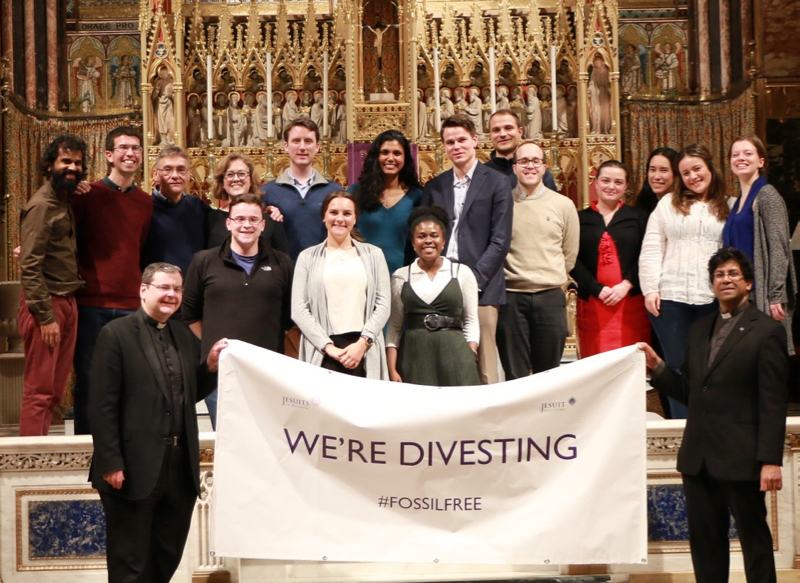The Jesuits have become the largest Catholic religious order in the UK to join the global fossil fuel divestment movement.
Jesuits in Britain announced today, Ash Wednesday, that they are to divest fully by the end of this year from companies whose major income is from the extraction of fossil fuels.
Jesuits in Britain has equity investments of about £400 million, looked after by three equity fund managers, and which are used to finance works and projects here and around the world. The fossil fuel divestment, already half completed, is just part of an in-depth examination of the orders investments which is also focusing on issues such as carbon footprint and human rights violations.
Jesuits in Canada, Italy and Australia have also announced they are divesting from fossil fuel companies along with the Jesuit European Social Centre in Brussels and the Jesuit Justice and Ecology Network Africa in Nairobi.
The Catholic dioceses of Middlesbrough and Lancaster became the first dioceses in England and Wales to divest from fossil fuels in January.
In addition, Jesuits in Britain and ten other institutional shareholders have asked Barclays to phase out its financing of fossil fuel companies that are active agents in driving the climate crisis in a move coordinated by the charity ShareAction and to be voted on at the bank's AGM in May.
Many other related projects are underway also, with a large number of academic and charitable organisations, all in line with the vision spelled out by Pope Francis in his encyclical Laudato Si'.
Fr Damian Howard SJ, provincial superior, said: "Every action ripples out, healing or hurting others. Lent is a great opportunity to take concrete steps to harmonise our own needs with those of others. Let's tackle climate chaos together. Our Jesuit communities are also working to develop more sustainable ways of living, switching to green electricity and getting rid of some of their cars.
“Climate change is the most pressing challenge the world faces as climate disasters wreak more and more destruction, hitting poorer countries the hardest, despite them having done the least to cause them.
"The decision to divest is principally a response to the clear moral imperative of acting to safeguard our planet for future generations at a time when scientific evidence is mounting that we are facing a grave climate emergency.
"What happens to the climate and the environment will have implications for us all. That’s why we need to act together to protect the conditions for human life. I am glad that the Jesuits can contribute to that joint effort.
“All our institutions need to respond to this ecological crisis and take bold action to reduce energy use and switch to renewable sources. Large-scale investors should be doing everything possible to help avert the severe consequences that could result if adequate measures are not taken.”
The decision aligns the Jesuits in Britain with a global movement of divesting institutions with a combined value of more than $14 trillion in assets under management, up from a starting point of $50 billion just five years ago.
Efa Ravelonantoandro, programmes officer of the Centre Sociale Arrupe in Madagascar, which is supported by Jesuit Missions, said: “Southern Madagascar is now too hot and we’re seeing more internal migration and with it a rise in crime and a lack of jobs. More frequent and severe flooding across the country has increased diseases among the population.
"The Centre Arrupe is directly affected because the medical clinic has been flooded. We do have lots of rivers in Madagascar, but we are not generating enough renewable energy. We need more investment in cleaner, renewable energy and a shift away from fossil fuel sources.”
The move comes as part of the lead up to the meeting called by Pope Francis in Assisi this March where he has invited young entrepreneurs and change makers to discuss sustainable economics, and also to the UN climate talks, COP26, in Glasgow this November.
Paul Chitnis, Director of Jesuit Missions, said: “The world must respond to the enormous challenges and opportunities of climate change with far greater urgency. COP 26 in Glasgow can be the right moment. We see the impact of climate change on communities everywhere and it is the poorest, most marginalised people who suffer most. That is why the British public expect the UK to meet its climate commitments, including credible net-zero policies with the public and private investment necessary to achieve them.”
James Buchanan, divestment campaigner at Christian climate change charity Operation Noah, said: “This significant decision taken by the Jesuits in Britain to divest from fossil fuel companies is the latest in a growing trend of religious institutions leading the way in shifting investments out of fossil fuels and investing in the clean technologies of the future. Of the total of more than 1,100 organisations contributing to the global divestment movement, 352 are faith-based institutions.”
Operation Noah is working with the World Council of Churches, the Global Catholic Climate Movement and others to invite Churches, religious orders and faith organisations from around the world to participate in a major global divestment announcement on 26 March 2020, which will coincide with the Economy of Francesco conference in Assisi initiated by Pope Francis.



 Loading ...
Loading ...